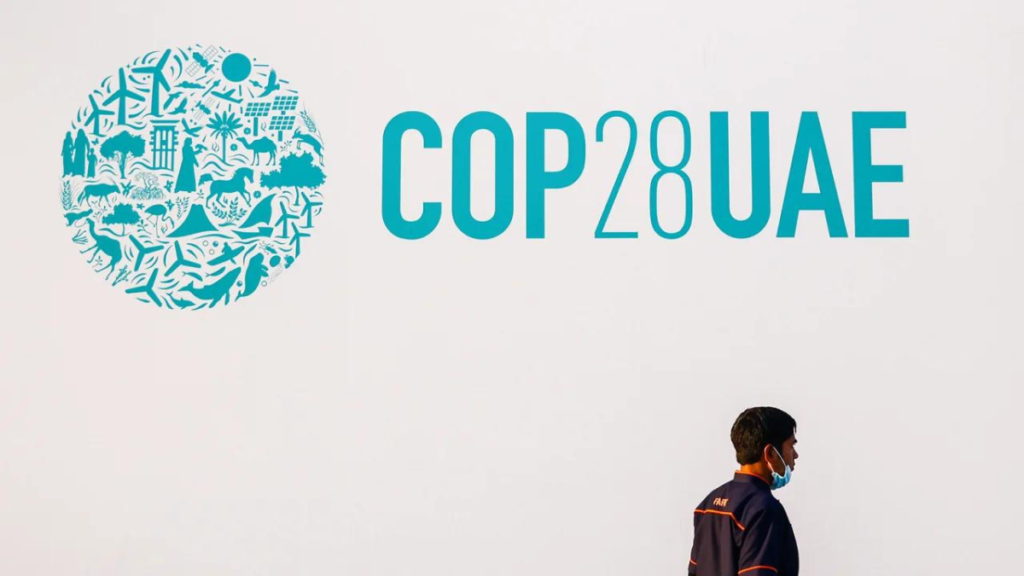The COP28 climate talks in Dubai have been criticized for revealing leaked documents suggesting the UAE was planning to leverage its position as the host to strike new oil and gas deals. The documents, published by the UK-registered Centre for Climate Reporting, contain briefing notes for Sultan Al Jaber, who is slated to preside over the UN climate negotiations. The leaked documents reveal a dual agenda for the UAE’s COP28 team, discussing countries’ climate progress in finance, decarbonization of food systems, and renewables, as well as suggestions to offer new oil and gas projects with the state-owned Abu Dhabi National Oil Company (ADNOC), led by Al Jaber. This contradicts the UN’s rules that prohibit the use of these meetings to promote the economic interests of the host country. The leaked documents also suggest that Masdar, the UAE’s main renewables vehicle, was also part of the agenda. The controversy highlights the need for stricter adherence to UN guidelines, which emphasize the impartiality of COP officials. Greenpeace International has condemned the alleged content of the leaked briefings as “totally unacceptable and a real scandal.”
Host Nation’s Dubious Agenda:
The leaked documents, organized as country profiles for meetings with foreign officials, reveal a dual agenda for the UAE’s COP28 team. While ostensibly discussing countries’ climate progress in finance, decarbonization of food systems, and renewables, the notes also include suggestions to offer new oil and gas projects with the state-owned Abu Dhabi National Oil Company (ADNOC), led by Al Jaber. This revelation contradicts the UN’s rules that prohibit the use of these meetings to promote the economic interests of the host country.
ADNOC’s Ambitions Amid Climate Talks:
ADNOC, planning to expand its oil and gas production, faces criticism for its association with COP28. Despite the company’s denial of using the climate talks for self-promotion, leaked notes indicate efforts to present new oil and gas projects, including liquefied natural gas (LNG) deals with Germany and potential collaborations with China in LNG projects across Mozambique, Canada, and Australia. The UAE’s ambitious goal to supply 25% of Germany’s hydrogen import demand also raises eyebrows, considering hydrogen production’s reliance on natural gas.
Masdar’s Role in the Controversy:
Further complicating matters, the notes suggest that Masdar, the UAE’s main renewables vehicle, led by Al Jaber as well, was also part of the agenda. The documents propose discussions on promoting projects with Masdar, adding another layer of complexity to the alleged exploitation of COP28 for economic gain. It remains unclear how many of the suggested meetings actually occurred, but the leaked notes shed light on the team’s intentions to use them as a platform for potential business deals.
Global Responses and Denials:
The leaked briefing notes involve prominent nations like the US, China, France, Germany, and the UK, raising concerns about the potential influence on key players in the climate talks. While the COP28 team denies the accuracy of the leaked documents, the lack of a clear denial regarding business interests and independence from ADNOC adds to the skepticism. Some countries acknowledged meetings but denied business discussions, emphasizing the need for transparency and accountability.
Implications for COP28 and UN Guidelines:
The controversy surrounding COP28 puts a spotlight on the need for stricter adherence to UN guidelines, which emphasize the impartiality of COP officials. The UNFCCC’s code of ethics underscores the importance of remaining unbiased and ensuring that personal views do not compromise the role and functions of UNFCCC officers. The alleged focus on economic interests during the climate talks raises questions about the integrity of the summit and its ability to address urgent climate issues.
Global Outcry and Greenpeace’s Response:
Greenpeace International has condemned the alleged content of the leaked briefings as “totally unacceptable and a real scandal.” The environmental organization contends that the climate summit leader should prioritize advancing climate solutions impartially, rather than engaging in backroom deals that exacerbate the climate crisis. The controversy underscores the concerns raised when an oil company CEO was appointed to lead a summit crucial for addressing the existential threat of climate change.
Conclusion:
As the world faces the urgent need to address climate change, the controversy surrounding the COP28 climate talks raises serious questions about the host nation’s priorities and adherence to ethical guidelines. The leaked documents, if accurate, suggest a disconcerting agenda that prioritizes economic interests over the global climate crisis. As the summit approaches, it remains to be seen how the international community will respond to these revelations and whether corrective actions will be taken to ensure the integrity and impartiality of COP28.







